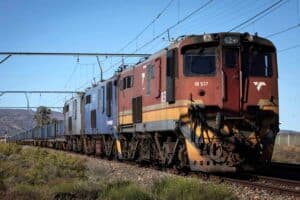It’s reaching boiling point, with reports that state-owned logistics operator Transnet is costing the economy R1bn a day.

Last week, the Durban Chamber of Commerce and Industry called on Public Enterprises Minister Pravin Gordhan to remove Transnet CEO Portia Derby and other key executives, claiming their lack of service delivery is sabotaging business.
This is the latest broadside against the state-owned logistics and ports operator, which is reckoned to be costing the country R1 billion a day through inefficiencies – equivalent to 5% of GDP in 2023, according to research by the Gain Group.
Not first call for heads to roll at Transnet
This is not the first time business has called for heads to roll at Transnet.
In December 2022, a leaked, confidential letter from the Minerals Council SA similarly called for Derby’s removal, as well as the head of Transnet Freight Rail, Sizakele Mzimela.
This was followed by a joint statement from Transnet and the Minerals Council emphasising their efforts to solve the rail and ports issues that had throttled miners’ ability to get their commodities to port.
These efforts included the formation of cooperative forums comprising the Minerals Council, mining houses and Transnet, intended to iron out operational inefficiencies and improve throughput.
Based on the Gain Group research, it’s hard to see whether these efforts have had any positive impact.
ALSO READ: Transnet’s deteriorating performance means government must act fast
Winds of change for Transnet board
But the winds of change are clearly gusting through Transnet’s Braamfontein head office.
In July, Gordhan announced nine new appointments to the Transnet board, including Minerals Council vice-president Andile Sangqu as chair – a logical choice, as the mining sector is Transnet’s biggest customer.
The Minerals Council estimates inefficiencies at Transnet may have cost the country R150 billion in lost sales in 2022. That figure has clearly risen in 2023.
Lost coal sales and Second World War freight volumes
Lost coal sales due to Transnet inefficiencies amounted to 22Mt (million tons) in 2022, a figure that will rise to about 30Mt in 2023, according to the Gain Group. Forex losses amounted to R88 billion in the coal sector alone in 2022, with a further R174 billion in foregone economic activity.
In terms of freight volumes, Transnet is back to where it was in the Second World War, while countries like India and China have experienced massive increases in both infrastructure and volumes.
The chamber’s letter comes just weeks after Transnet announced a R5.7 billion loss for the year to March 2023, a more than R10 billion reversal from the R5 billion profit announced in 2022.
The taxpayer is required to underwrite these losses and Transnet’s loan book – with no clear evidence of sustainable recovery.
Tough talk…and more promises
Last week’s letter from the Durban chamber is indicative of the rising frustration with the slow progress at Transnet, with words like “sabotage” being used to characterise senior management at the rail and ports operator.
The eThekwini business community believes Derby’s behaviour is “clearly geared towards sabotaging businesses, through the lack of service delivery with the current port infrastructure,” the letter said.
In a response on Friday, Transnet said it is aware of the chamber’s letter calling for the removal of its leaders, adding that a meeting had been held with the chamber’s CEO, Palesa Phili, and “the parties have agreed to collaborate on finding solutions to the pressing challenges”.
Also present at the meeting on Friday were Derby and eThekwini Mayor Mxolisi Kaunda.
“A meeting will be held as a matter of urgency to discuss the critical issues which cause frustration to the members of the Chamber,” the Transnet statement said.
A joint statement is expected shortly.
This sounds like a possible replay of the Mineral Council’s blunt letter in December last year, followed by soothing promises of cooperation.
‘I am deeply concerned for Transnet’
In response to the Transnet statement on Friday to find solutions to the problems that trouble the chamber, Jan Havenga, Stellenbosch University professor of logistics, said:
“I don’t know how they might have resolved it. But I’m deeply concerned for Transnet. [This should] also [be] seen in the light of the Minerals Council’s letter of late last year. Combined with the loss of more than a quarter of freight, the biggest financial loss ever, [and] the R1 billion that Transnet is costing the economy every day, I think concern is warranted.
“In this case, however, both the president and [Gordhan] got involved and are doing the right thing,” he added.
“The president, with the establishment of the NLCC [National Logistics Crisis Committee], and the minister in appointing a new competent board with very clear and direct instructions and mandate. I’m hopeful.”
ALSO READ: Transnet’s radical board shake-up aimed at fixing rail and ports
Gordhan’s board reshuffle; review of excessive costs
Gordhan’s board reshuffle at Transnet comes with clear instructions to address deficiencies in operational performance and to identify reasons why management is unable to reach performance targets.
Also up for review are excessive costs, the need for a system of accountability and a review of executive management “with a view to establishing whether persons with the right skills are optimally utilised to deliver on the mandate”.
Despite promises to the contrary, there have been rumblings in recent months about Transnet management resenting what it sees as interference in its internal affairs by the business sector. As one commentator pointed out, this is a national emergency and needs to be treated as such.
Business cannot be left out of the solution.
This article is republished from Moneyweb under a Creative Commons licence. Read the original article.






